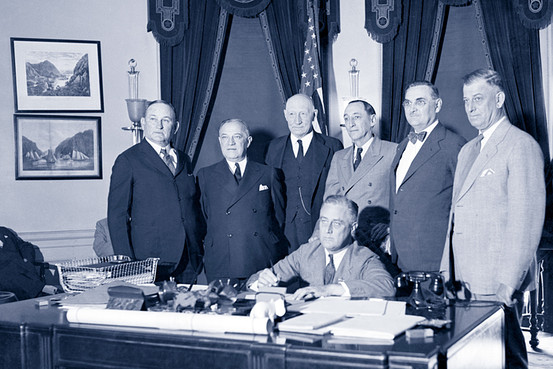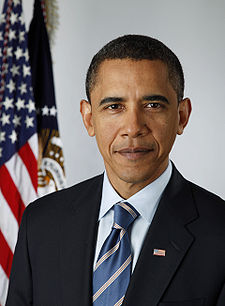|
|
|
|
Investing in Human Capital
Our
greatest task is to put people to work. This
is no unsolvable problem if we face it wisely and courageously. It
can be accomplished in part by direct recruiting by the Government itself,
treating the task as we would treat the emergency of war, but
at the same time, through this employment, accomplishing greatly
needed projects to stimulate and reorganize the use of our national
resources. First Inauguration speech of President Franklin D. Roosevelt, 04.03.33
United States Civilian Conservation Corps (CCC). The CCC provided work and vocational training for unemployed single young men through conserving and developing the country's natural resources. In 1932, President Franklin Deleno Roosevelt was elected promising a America a New Deal. In response to the depression that hung over the nation in the early 1930s, President Roosevelt created many "Alphabet Soup" programs designed to put Americans back to work. Roosevelt was not interested in the dole. He was was determined, rather, to preserve the pride of American workers in their own ability to earn a living, so he concentrated on creating jobs. The first 100 days of his administation he called a special session of Congress on March 9, 1933. He shepherded the first "Alphabet Soup" legistlation for the Emergency Conservation Work Act (ECW), better known as the Civilian Conservation Corps (CCC) through both houses. It was signed into law on March 31, 1933. The CCC was the first government agency with a clause that prohibited discrimination in hiring. FYI - SELECTED DRAFT LEGISLATION, LEGISLATION, AND EXECUTIVE ORDERS AFFECTING THE CIVILIAN CONSERVATION CORPS
CONTEMPORARY CCC SLIDESHOW
AT WORK AND AT PLAY
The men lived in government camps, food, transport, and clothing were provided and also recieved added benefit of education and vocational training. The Army mostly supervised the camps. Men were paid a dollar a day and were required to send 83.3 percent of their pay of $30 back to their families. By July 1933, over 250,000 work boots where on the ground from Hawiaii to the Virgin Islands. Over the next nine years, this popular New deal "alphabet soup" government program helped create our middle class from the depths of the Great Depression and conserved our environment. The CCC program enrolled a total of 3,465,766 men and employed 263,755 military personnel, educational advisors, work supervisors, and non-enrolled personnel. At its peak in 1935, the organization had more than 500,000 members in over 2,600 camps. These were usually operated by the War Dept., but the men were not subject to military control. In 1939 the CCC was made part of the Federal Security Agency. Beginning in 1940, greater emphasis was placed on projects aiding national defense. It served America well for nine years from 1933 to 1942. After Pearl Harbor, the CCC men went off to war and its budget was cut against President Franklin D. Roosevelt's request, Congress abolished the CCC in 1942. REINVEST IN HUMAN CAPITOL
"Know that your people will judge you on what you can build, not what you destroy." President Barack Obama, Inaugual Address, January 20, 2009. I want generations that follow to
see that we used this moment to encourage a 21st Century Civilian Conservation Corps for our young people. President
Barack Obama's address at the 160th Anniversary Celebration of the Department of the Interior March 3, 2009
A nation that continues year after
year
to spend more money on military defense than on programs of social uplift is approaching spiritual death.
Dr Martin Luther King, Jr
CCC Enrollee Oath
(Upon entering the CCC, each enrollee subscribed to the following oath. It is a contract between the enrollee and the U.S. Government, and should be lived up to in each respect.) I, _______________ , do solemnly swear that the information given above as to my status is correct. I agree to remain in the Civilian Conservation Corps for the period terminating at the discretion of the United States between ..................... unless sooner released by proper authority, and that I will obey those in authority and observe all the rules and regulations thereof to the best of my ability and will accept such allowances as may be provided pursuant to law and regulations promulgated pursuant thereto. I understand and agree that any injury received or disease contracted by me while a member of the Civilian Conservation Corps cannot be made the basis against the government, except such as I may be entitled to the Act of September 7, 1916(39 Stat. 724) ( an act to provide compensation for employees of the United States suffering injuries while in the performance of their duties and for other purposes), and that I shall not be entitled to any allowances upon release from camp, except transportation in kind to the place at which I was accepted for enrollment. I understand further that any articles issued to me by the United States Government for the use while a member of the Civilian Conservation Corps are, and remain, property of the United States Government and that willful destruction, loss, sale, or disposal of such property renders me financially responsible for the cost thereof and liable to trial in the civil courts. I understand further that any infraction of the rules or regulations of the Civilian Conservation Corps renders me liable to the expulsion therefrom. So help me God. From: "Your CCC Handbook For Enrollees" Happy Days Publishing Co., Washington , D.C. - - CCC Camp Information (1933-1942)
Average number of camps operating in U.S. per year: 1,643
*The future operation and administration of the Civilian Conservation
Corps program would be updated but strictly run by the
public sector and not outsourced to the private sector. *The CCC's operation and administration would be carried
on by the existing machinery of the US Government under a number of
our United States Agencies working in cooperation. *Similar federally funded government work programs should
be absorbed into the US Civilian Conservation Corps to avoid waste
in overlap, fraud and abuse. *This
program would ensure government accountability to the people of the United States.
The reactivation of the United States Civilian Conservation Corp, in Summary... * This popular government program was never abolished in June 1942. * The US Government should reactivate the United States Civilian Conservation Corps as a part
of the the Defense Budget, or as a part of the Recovery and Stimulus packages! * The United States Civilian Conservation Corps operational procedures and
regulations will need updated. * There is a backlog of needed work projects on our Public lands and the workforce that would accomplish it would be the Civilian Conservation Corps.
The CCC would also maintain millions of acres of public lands, shores and
waterways and would preserve and protect our precious natural resources and
contribute directly to our National Defense. *CCC would mobilize with The American Red Cross and FEMA in disaster relief and clean-up. *Can be the first job opportunity for our
young adults and returning War Veterans who now face double-digit unemployment. * The US Civilian Conservation Corps would provide us with a new workforce that has a work ethic and a respect for conservation and the environment. * The CCC would perform labor intensive-low tech green jobs from planting trees to helping with disaster
relief. They would perform high tech green jobs as in the installation
and maintenance of PVC panels and wind generators. *Can be adopted in other countries to give us all a chance to survive rapid climate change. * If reactivated, the president would order the Department of Defense into
action and the US Army - National Guard and Reserves
would benefit the American People. This program can give the military an accountable, practical and peaceful
mission on our own soil and give our young men and women a real alternative
national service. *Reactivation would be a win-win, non-partisan platform issue on the 2010 Congressional
mid-term elections. .... please spread this idea and website to your contacts! |
||||||||||||||||||||||||||||||||
|
Our greatest task is to put people to work. This is no unsolvable problem if we face it
wisely and courageously. It can be accomplished in part by direct recruiting by the Government itself,
treating the task as we would treat the emergency of war, but at the same time, through this employment,
accomplishing greatly needed projects to stimulate and reorganize the use of our national resources. First Inauguration speech of President Franklin D. Roosevelt on Saturday, March 4, 1933. 76
YEARS LATER I want generations that follow to see that we used this
moment to encourage a 21st Century Civilian Conservation Corps for our young people. President Barack Obama's address at the 160th Anniversary Celebration of the Department of the
Interior March 3, 2009 |


